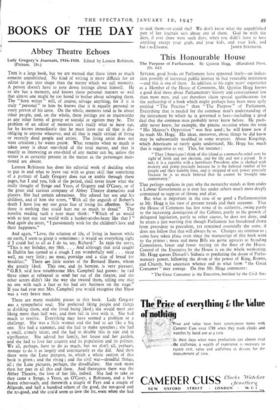BOOKS OF THE DAY
Abbey Theatre Echoes
Lady Gregory's Journals, 1916-1930. Edited by Lennox Robinson. (Putnam.. 18s.)
Tuts is a large book, but we are warned that three times as much remains unpublished. No kind of writing is more difficult for an editor to put into shape than the matter which we call memoirs. A person doesn't have to note down jottings about himself. He or she has a memory, and knows those personal matters so well that almost one might be too bored to bother about salvaging them. The " born writer " will, of course, salvage anything, for if it is truly "personal" to him he knows that it is equally personal to every person of his caste. On the whole, memoirs tend to be about other people, and, on the whole, these jottings are as trustworthy as any other forms of gossip or scandal or egoism may be. The problem of an editor of memoirs isn't really what to leave our, for he knows immediately that he must leave out all that is dis- obliging to anyone whatever, and all that is really critical of living or recently dead people and artists. The living artist does not want criticism ; he wants praide. What remains when so much is taken away is about one-third of the total matter, and that is exactly as interesting as one-third of any matter can be, unless the writer is as certainly present in the matter as the personages men- tioned are absent.
Lennox Robinson has done his editorial work of deciding what to put in and what to leave out with so great skill that something of a portrait of Lady Gregory does run or amble through these pages, but I and you, folk of the period, shall never know what she really thought of Synge and Yeats, of Gogarty and O'Casey, or of the great and curious company of Abbey Theatre dramatists and players. She had certain adoration. She adored her son and his children, and of him she notes, " With all the anguish of Robert's death I have lost my one great fear of losing- his affeetton. Now there is nothing that could hurt me so much to dread." The novelist reading such a note must think: "Which of us would wish to trot out our world with a hanker-at-the-heart like' that ? " And again she notes, "I passionately wish for the children's love and their happiness."
And again, " Love, the solution of life, of living in heaven while on earth, I seem to grasp it sometimes: it would set everything right if I could feel to all as I do to, say, Richard." In.193o she notes, "This is my bithday, my 78th. . . . And although that cold caught in Dublin has turned to a cough I am wonderfully well . . . sleep well, eat very little ; no meat, porridge and a slice of bread to: breakfast." There are little stories of the Bernard Shows, whom she greatly liked. This one, and its heroine, is very pleasant. "G.B.S. said how troublesome Mrs. Campbell had grown: he Lad three times at rehearsal to send her out of the theatre, and the other actors didn't like the way she treated them, telling one that no one with such a face as his had any business on the stage." If you had ever met Mrs. Campbell you would recognise that Shaw was a very brave man.
There are many readable pieces in this book. Lady Gregory was a sympathetic soul. She preferred liking people and things to disliking them, and she loved being liked; she would meet any liking more than half way, and then fall in love with it. She had much to resolve. Everything may have seemed a problem or a challenge. She was a little woman and she had to act like a big one. She had a stammer, and she had to make speeches ; she had a small, comely talent, and she had to double this in size and in significance. She adoced her family, her house and her garden, and she had to love her country and its population and its politics.- We all, perhaps, have to do as much, but we don't all, perhaps, manage to do it as largely and continuously as she did. And then there were the Lane pictures, to. which a whole section of this book is given ; and the rising ; and the civil war—dreadful things, all; the Lane pictures, perhaps, the dreadfullest. She took more than her part in all this and these. And thereupon there was the Abbey Theatre, the love of her life, indeed. She had to take as they came a Synge, a Yeats, an O'Casey, a Robinson, and a few dozen other-such, and therewith a couple of Fays and a couple of Allgoods, and half a hundred others of the good; the not-good and the no-good, and she cou'd seehrtcr.love the lot, even •when she had
to sack them—or could she? We don't know what the unpublished part of her journals says about any of them. God be with the days, if ever there were such days, when you didn't have to love anything except your grub, and your kids, and your kirk, and


































 Previous page
Previous page